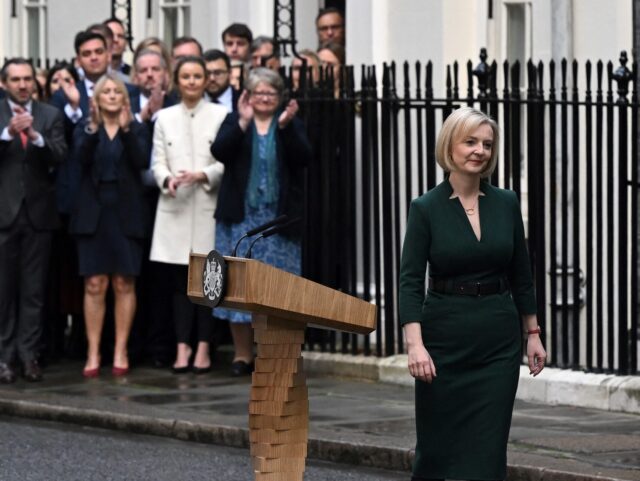Former prime minister Liz Truss has spoken out on her ouster, saying MPs within her own party who have bought into leftist tax-and-spend orthodoxy, the deep state, and foreign actors including U.S. President Joe Biden killed her premiership before she had “a realistic chance” to govern.
Truss, who became something a political answer to Jane Grey, England’s ‘Nine-Days Queen’, when parliamentary elites in her party killed her premiership after a historically brief 49 days, easily defeated Rishi Sunak in a Conservative Party leadership contest on a platform of tax cuts, deregulation, and energy independence.
Within a remarkably short span of time, however, she was forced to take her Chancellor of the Exchequer, Kwasi Kwarteng, and replace him with China-linked lockdown authoritarian Jeremy Hunt, and then forced out of office herself — with party politicians subsequently imposing Sunak, who they had wanted as leader in the first place, as leader, without giving members another chance to vote for their preferred candidate.
“I assumed upon entering Downing Street that my mandate would be respected and accepted. How wrong I was. While I anticipated resistance to my programme from the system, I underestimated the extent of it,” Truss wrote in a long essay for The Sunday Telegraph.
“I am not claiming to be blameless in what happened, but fundamentally I was not given a realistic chance to enact my policies by a very powerful economic establishment, coupled with a lack of political support,” she said of the market reaction to her so-called mini-budget, which provided the pretext for the Conservative parliamentary party — that is, MPs alone, not the activists and supporters at large — to remove her.
“I underestimated the resistance inside the Conservative parliamentary party to move to a lower-tax, less-regulated economy,” she said of her colleagues — who continue to sell themselves to their base as the party of lower taxes and a smaller state while they actually increase the tax burden and controls on industry and speech — stressing that “pessimism and scepticism about the growth potential of the British economy are sadly endemic at the Treasury” and that its bureaucrats not only saw Brexit, for example, “as a damage-limitation exercise rather than a once-in-a-generation opportunity”, but were resistant to any break with leftist tax-and-spend “orthodoxy”.
“This high-spend, high-tax policy view does not just prevail in the UK. We were also swimming against the international tide,” she said, suggesting her policies were deliberately targeted by foreign globalists.
“There was a concerted effort by international actors to challenge our Plan for Growth. The IMF [International Monetary Fund] commented on distributional aspects rather than market stability which it is hard to conclude was anything but politically motivated,” she said.
“Then there was the intervention from President Biden, who publicly voiced his disagreement with our economic policy, stating: ‘I wasn’t the only one that thought it was a mistake.'”
Truss insisted that, in essence, her original plan had been the right one, but that “the forces against it were too great.”
“I am not claiming to be blameless in what happened, but fundamentally I was not given a realistic chance to enact my policies by a very powerful economic establishment, coupled with a lack of political support,” she complained.
With respect to the detail of the mini-budget market turmoil, she said it was rooted in issues related to pension funds and liability-driven investments (LDIs) — which she said Treasury officials had not “mentioned at all to me, the chancellor or any of our teams” before it was announced.
“Readers will not be surprised that, given their impact on events, since leaving office I have spent some time looking into LDIs. I was shocked by what I discovered,” she said, claiming that pension funds, finding themselves underfunded in the 2000s, began to increasingly resort to them with the seeming encouragement of the official Pensions Regulator.
“Astonishingly, it turns out that the value of total assets in LDI strategies is equivalent to around 60 per cent of the UK’s GDP,” she said, claiming that interest rate rises by the Bank of England and U.S. Federal Reserve ahead of her mini-budget meant that, unbeknownst to her, she was facing an economic “tinderbox”, despite the sums involved being far less than Rishi Sunak’s lockdown-era furlough scheme, for example.
The Telegraph‘s chief City commentator, Ben Marlow, suggested late last September that issues with LDIs remain essentially unresolved, describing them as a “ticking time bomb” under the pensions market and calling for “an immediate and full-scale investigation into the extent to which this opaque and little-known corner of the financial world represents a genuine risk to UK financial stability” and “how this market was able to balloon to such a jaw-dropping size seemingly without any meaningful intervention from the regulators.”

COMMENTS
Please let us know if you're having issues with commenting.